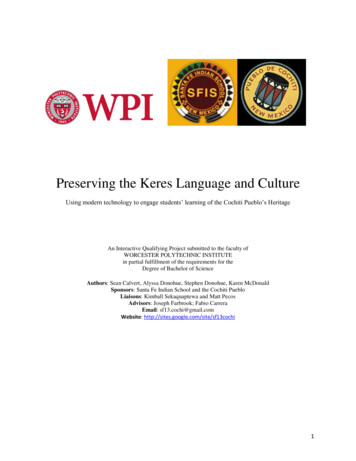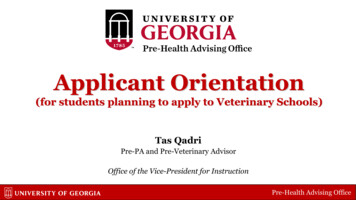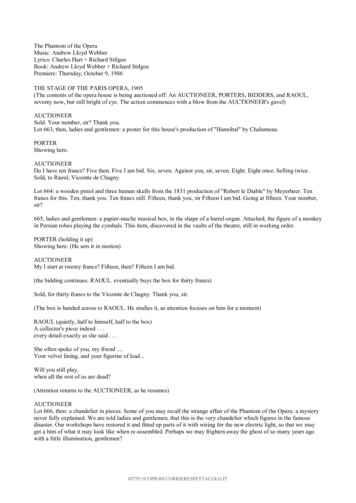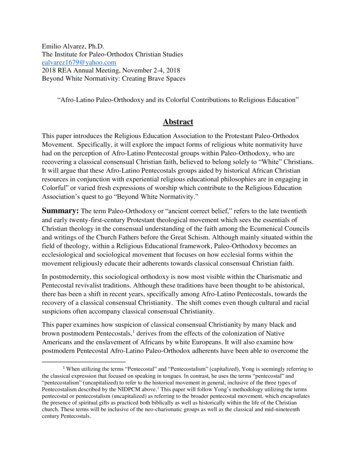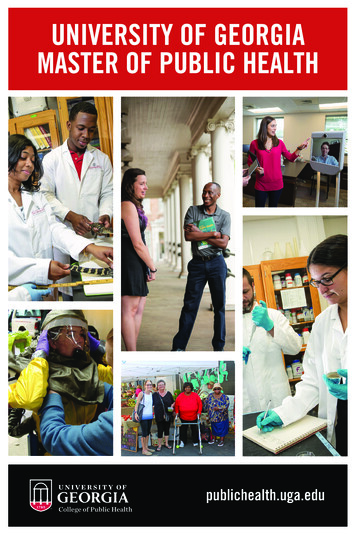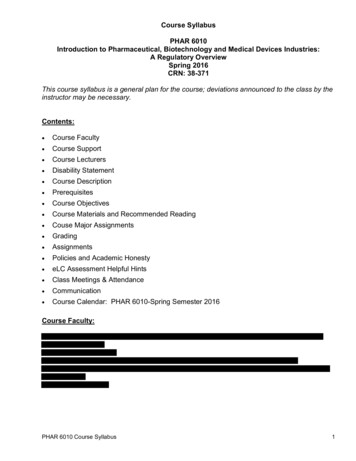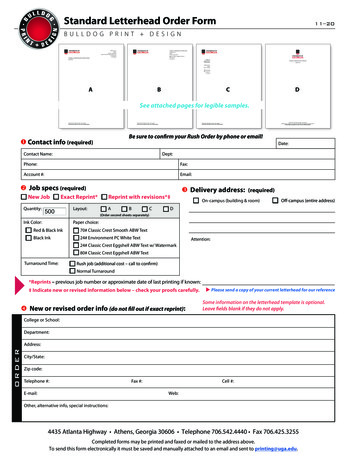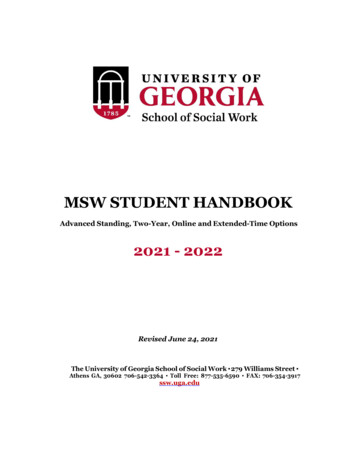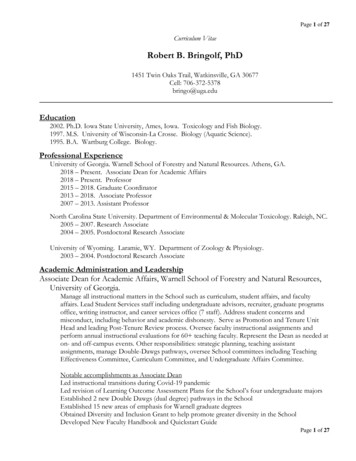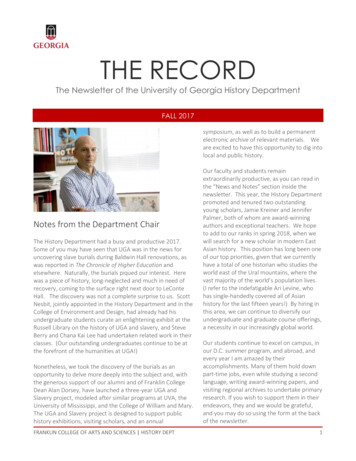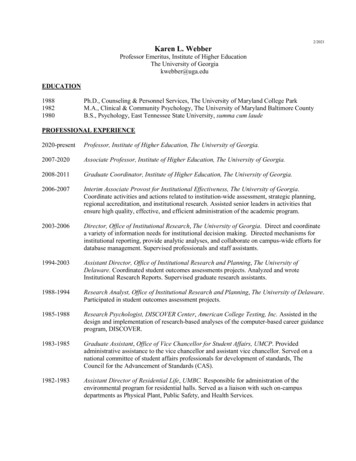
Transcription
Karen L. Webber2/2021Professor Emeritus, Institute of Higher EducationThe University of Georgiakwebber@uga.eduEDUCATION198819821980Ph.D., Counseling & Personnel Services, The University of Maryland College ParkM.A., Clinical & Community Psychology, The University of Maryland Baltimore CountyB.S., Psychology, East Tennessee State University, summa cum laudePROFESSIONAL EXPERIENCE2020-presentProfessor, Institute of Higher Education, The University of Georgia.2007-2020Associate Professor, Institute of Higher Education, The University of Georgia.2008-2011Graduate Coordinator, Institute of Higher Education, The University of Georgia.2006-2007Interim Associate Provost for Institutional Effectiveness, The University of Georgia.Coordinate activities and actions related to institution-wide assessment, strategic planning,regional accreditation, and institutional research. Assisted senior leaders in activities thatensure high quality, effective, and efficient administration of the academic program.2003-2006Director, Office of Institutional Research, The University of Georgia. Direct and coordinatea variety of information needs for institutional decision making. Directed mechanisms forinstitutional reporting, provide analytic analyses, and collaborate on campus-wide efforts fordatabase management. Supervised professionals and staff assistants.1994-2003Assistant Director, Office of Institutional Research and Planning, The University ofDelaware. Coordinated student outcomes assessments projects. Analyzed and wroteInstitutional Research Reports. Supervised graduate research assistants.1988-1994Research Analyst, Office of Institutional Research and Planning, The University of Delaware.Participated in student outcomes assessment projects.1985-1988Research Psychologist, DISCOVER Center, American College Testing, Inc. Assisted in thedesign and implementation of research-based analyses of the computer-based career guidanceprogram, DISCOVER.1983-1985Graduate Assistant, Office of Vice Chancellor for Student Affairs, UMCP. Providedadministrative assistance to the vice chancellor and assistant vice chancellor. Served on anational committee of student affairs professionals for development of standards, TheCouncil for the Advancement of Standards (CAS).1982-1983Assistant Director of Residential Life, UMBC. Responsible for administration of theenvironmental program for residential halls. Served as a liaison with such on-campusdepartments as Physical Plant, Public Safety, and Health Services.
Karen L. Webber 2TEACHINGCourses Taught – The University of GeorgiaIntroduction to Research in Higher Education (graduate level)Institutional Research (graduate)Data Analytics in Higher Education (graduate)Introduction to the NCES/NSF National Datasets (graduate)M.Ed. Capstone Seminar (graduate)The Psychology of Women (undergraduate)Psychology of Women Seminar (freshman seminar)Courses Taught – The University of DelawareThe American College Student (graduate level)Introduction to Student Personnel (graduate)The Psychology of Women (undergraduate)Child Psychology (undergraduate)JOURNAL ARTICLES, published or acceptedWebber, K.L. & Burns, R.A. (2020). Increases in graduate student debt: National trends from 2000 to 2016.Research in Higher Education, DOI: 10.1007/s11162-020-09611-xCrain, A., & Webber, K.L. (2020, accepted). Across the urban divide: STEM pipeline engagement amongstudents. Journal of Research in STEM Education.Webber, K.L. (2020). Can you trust your eyes?: Learn how to minimize misinterpretation of data reports andvisualizations. Planning for Higher Education, 48(2), 1-7.Burns, R. & Webber, K. (2019). Achieving the promise of educational opportunity: graduate student debt forSTEM vs. Non-STEM students, Journal of Student Financial Aid, 48(3), 1-29.Webber, K.L. (2018). The environment matters: Job satisfaction for full-time faculty members at US fouryear colleges and universities. Higher Education, 78(2), 323-343. doi: 10.1007/s10734-018-0345-z.Webber, K.L. & Rogers, S. (2018). Gender differences in faculty member job satisfaction: Equityforestalled? Research in Higher Education, 59 (8), 1105-1132. doi.org/10.1007/s11162-018-9494-2.Webber, K.L. & González Canché, M. (2018). Is there a gendered path to tenure?: A multistate analysis of theacademic trajectory of US doctoral recipients in the sciences. Research in Higher Education. 59(7),897-932, doi.org/10.1007/s11162-018-9492-4.Webber, K.L. (2018). Help them pay: Graduate student debt. NACUBO Business Officer, 51(8), 36-42.Xu, Y., & Webber, K. (2018). College student retention on a racially diverse campus: A theoretically guidedreality check. Journal of College Student Retention: Research, Theory and Practice. 20(1), 2-28.Heager, H., BrckaLorenz, A., & Webber, K. (2016). Participation in undergraduate research at minorityserving institutions. Perspectives on Undergraduate Research and Mentoring. 4(1), 1-22.Webber, K.L. & González Canché, M. (2015). Not equal for all: Gender and race differences in salary fordoctoral degree recipients. Research in Higher Education, 56(7), 645-672.
Karen L. Webber 3Webber, K.L. & Yang, L. (2015). The career path of the postdoctoral researcher. Change: The Magazine ofHigher Learning, 47(6), 53-58.Yang, L. & Webber, K.L. (2015). A decade beyond the doctorate: The influence of a U.S. postdoctoralappointment on faculty career, productivity, and salary. Higher Education. 70(4), 667-687.Webber, K.L., & Rogers, S.L. (2014). Student loan default: Do characteristics of four-year institutionscontribute to the puzzle? Journal of Student Financial Aid, 44(2), 99-124.Belasco, A., Trivette, M., & Webber, K. (2014). Advanced degrees of debt: Analyzing the patterns anddeterminants of graduate student borrowing, Review of Higher Education, 37(4), 469-497.Webber, K.L. (2014). Work roles and salary growth of foreign-born doctoral recipients in the US: 1999 to2008. Journal of Higher Education Management, 8(3), 63-69.Webber, K.L., & Yang, L. (2014). The increased role of foreign-born academic staff in US higher education.Journal of Higher Education Policy and Management. 36 (1), 43-61.Webber, K.L. (2013). Cultivating the future of graduate education: Differences in salary and employment ofdoctoral degree recipients. Planning for Higher Education, 41(4), 1-7.Webber, K.L., Nelson Laird, T., & BrckaLorenz, A. (2013). Student and faculty engagement in undergraduateresearch: Evidence from NSSE and FSSE. Research in Higher Education, 54(2), 227-245.Webber, K.L. (2013). Research productivity of science and engineering faculty at US universities: Thecontribution of foreign vs. US-born status. Journal of the Professoriate, 7(1), 51-83.Webber, K.L. & Tschepikow, K. (2013). The role of learner-centered assessment in organizational change.Assessment in Education: Principles, Policy, and Practice, 20(2), 187-204.Webber, K.L., Krylow, R., & Zhang, Q. (2013). Does involvement really matter: Indicators of college studentsuccess and satisfaction. Journal of College Student Development. 54(6), 591-611.Webber, K.L. (2012). The role of institutional research in a high profile study of undergraduate research.Research in Higher Education, 53(3), 695-716.Webber, K.L. (2012). The use of learner-centered assessment in U.S. colleges and universities. Research inHigher Education, 53(2), 201-228.Webber, K.L. (2012). Research productivity of foreign- and US-born faculty: Exploring the differences.Higher Education, 64(5), 709-729.Webber, K.L., Fechheimer, M., & Kleiber, P. (2012). Defining and measuring participation in undergraduateresearch at the University of Georgia. Council for Undergraduate Research Quarterly, 32(3), 15-17.Webber, K.L. (2011). Faculty productivity: Implications for academic planners. Planning for HigherEducation, 39(4), 32-43.Fechheimer, M., Webber, K.L., & Kleiber, P.K. (2011). How successful are undergraduate research programspromoting engagement and transformation of students? CBE-Life Sciences Education,10(2), 156-163.
Karen L. Webber 4Mathies, C. & Webber, K. (2009). Inflated or not? An examination of grade change. Enrollment ManagementJournal, 3(3), 10-33.Bauer, K. (Webber). & Bennett, J.S. (2003). Alumni perceptions on the value of undergraduate research.Journal of Higher Education, 74(2), 210-230.Bauer, K.W. & Liang, Q. (2003). The effect of personality and precollege characteristics on first yearactivities and academic performance. Journal of College Student Development, 44(3), 277-290.Bauer, G., Bauer, K.W., & Abraham, A. (2003). General education and assessment at research universities.Peer Review, 5(4), 23-25.Zydney, A., Bennett, J., Shahid, A., & Bauer, K.W. (2002). Faculty perspectives regarding undergraduateresearch in science and engineering. Journal of Engineering Education, 91(3), 291-297.Zydney, A.L., Bennett, J. S., Shahid, A. & Bauer, K.W. (2002). Impact of undergraduate research experiencein engineering. Journal of Engineering Education, 91(2), 151-157.Bishop, J.B., Bauer, K.W., & Trezise, E. (1998). Surveying student needs: A systematic replication. TheJournal of College Student Development, 39(2), 205-210.Bauer, K.W. & Green, K.E. (1996). Graduate student sexual harassment: Do personal perceptions make adifference? Initiatives: Journal of the National Association for Women in Education, 57, 43-50.Bauer, K.W. (1995). Freshman to senior year gains reported on the college student experiences questionnaire.NASPA Journal, 32, 130-37.Bauer, P.F. & Bauer, K.W. (1994). The community college as an academic bridge: Academic and personalconcerns of community college students before and after transferring to a four-year institution.College and University, 69, 116-122.Bauer, K.W. (1992). Self-reported gains in academic and social skills. Journal of College StudentDevelopment, 33(6), 492-498.Bauer, K.W., Mitchell, F.R., & Bauer, P.F. (1991). Students’ perceptions of selected academic and personalcharacteristics acquired at community colleges. College and University, 67(1), 65-71.Blass, T. & Bauer, K.W. (1988). Predicting behavior from the Piers-Harris Children’s Self-Concept Scale.Journal of Personality and Individual Differences, 9, 919-921.Papers Currently Under ReviewWebber, K.L. (2021, January). The cultured climate: Faculty satisfaction at four-year colleges and universitiesin the US. Revise and Resubmit, Journal of Faculty Development.Burns, R., & Webber, K.L., The price of access: Graduate student debt for students of color 2000 to 2016.Botha, J., Webber, K.L., Williams, J., & Woodfield, S. Building capacity in institutional research:Collaboration and complementarity.Webber, K.L. & Yandell, A. Faculty member satisfaction and imploications for international faculty.
Karen L. Webber 5BOOKS/MONOGRAPHSWebber, K.L. & Zheng, H. (Eds.) (2020). Big Data on campus: Data-informed decision making in highereducation. Johns Hopkins University Press.Webber, K.L. (Ed.) (2018). Building capacity in institutional research and decision support in highereducation. Springer Press. ISBN 978-3-319-71162-1.Webber, K.L. & Calderon, A. (Eds.) (2015). Institutional research and planning in higher education: Globalthemes and contexts. Routledge Press/Taylor & Francis. ISBN 978-1-138-02144-0.Calderon, A., & Webber, K.L. (Eds.) (2013). Global perspectives of institutional research: Relevant issuesfor today and considerations for the future. New directions for institutional research, #157.JosseyBass.Webber, K.L. (Ed.) (2008). International perspectives on accountability, affordability, and access. Newdirections for institutional research, winter supplement. Jossey-Bass.Bauer, K.W. (Ed.) (1998). Campus climate: Understanding the critical components of today’s colleges anduniversities. New directions for institutional research, #98. Jossey-Bass.Middaugh, M.F., Trusheim, D.W., & Bauer, K.W. (1994). Strategies for the practice of institutional research:Concepts, resources and applications. Association for Institutional Research Information Series # 9.Association for Institutional Research.Bauer, K.W. (Ed.) (1993). Psychology of women: Selected readings. Kendall/Hunt Publishing.BOOK CHAPTERSWebber, K.L., Robert, J., Tanner, D., Moore, M., & Burg, T. (2020). Measuring the impact of businessengagement on STEM Education. In C. Johnson et al. (Eds.), Handbook of research on STEMeducation, (pp. 459-469), Routledge/Taylor & Francis.Webber, K. & Zheng, H. (2020). Analytics and the imperatives for data-informed decision making in highereducation. In K. Webber & H. Zheng (Eds.) Big Data on campus: Data-informed decision making inhigher education. Johns Hopkins University Press.Webber, K., & Morn, J. (2020). The limitations of analytics in data-informed decision making - the humanfactors and ethical considerations. In K. Webber & H. Zheng (Eds.) Big Data on campus: Datainformed decision making in higher education Johns Hopkins University Press.Webber, K. & Zheng, H. (2020). Data analytics in higher education: Implications for the future. In K. Webber& H. Zheng (Eds.) Big Data on campus: Data-informed decision making in higher educationHopkins University Press.Webber, K.L. (2019, accepted). Building capacity in IR and decision support: Alliances for higher educationresearch (HER) and institutional research (IR). Paper included in the Proceedings for the AustrianHigher Education Research Network, Vienna, AU.
Karen L. Webber 6Webber, K.L. (2018). Institutional research and decision support in higher education today. In K.L. Webber(Ed.). Building capacity in institutional research and decision support in higher education. (pp. 318). Springer Press. ISBN 978-3-319-71162-1.Webber, K.L. (2018). The future of IR and decision support: Ensuring a seat at the table. In K.L. Webber(Ed.). Building capacity in institutional research and decision support in higher education. (pp. 261276). Springer Press. ISBN 978-3-319-71162-1.Botha, J., Muller, N. & Webber, K.L. (2016). Institutional research in South African higher education:framing the contexts and practices. In J. Botha & N. Muller, Institutional research in South Africa:Global contexts and themes. (pp. 1-22), Sun Press.Botha, J., Muller, N. & Webber, K.L. (2016). Institutional research in higher education in South Africa:Looking ahead. In J. Botha & N. Muller, Institutional research in South Africa: Global contexts andthemes. (pp. 355-361), Sun Press.Webber, K.L. & Calderon, A. (2015). Institutional research and planning: Its role in higher education decisionsupport and policy development. In J. Huisman, H. de Boer, D. Dill & M. Souto-Otero (Eds.),Handbook of higher education policy and governance.(pp. 192-208). MacMillan.Borden, V., & Webber, K.L. (2015). Institutional and educational research in higher education: Commonorigins, diverging practices. In K. Webber & A. Calderon (Eds.), Institutional research and planningin higher education: Global themes and contexts. (pp. 16-27). Routledge Press/Taylor & Francis.Webber, K., (2015). Eyes to the future: The future of institutional research. In Webber, K. & A. Calderon(Eds.), Institutional research and planning in higher education: Global themes and contexts. (pp.229-227). Routledge Press/Taylor & Francis.Calderon, A., & Webber, K.L. (2015). Institutional research, planning, and decision support in highereducation today. In Webber, K. & A. Calderon (Eds.), Institutional research and planning in highereducation: Global themes and contexts. (pp. 3-15). Routledge Press/Taylor & Francis.Webber, K.L. (2015). Faculty use of assessment practices: Evidence from the National Study ofPostsecondary Faculty. In M. Li & Y. Zhao (Eds.), Exploring teaching and learning in highereducation, (pp. 369-394), Springer Press. ISBN: 978-3-642-55351-6; DOI: 10.1007/978-3-64255352-3.Taylor, B.J., Webber, K.L., & Jacobs, G. (2013). Institutional research in light of internationalization, growth,and competition. In Calderon, A., & Webber, K.L. (Eds.), Global perspectives of institutionalresearch: Relevant issues for today and considerations for the future. New directions for institutionalresearch. Jossey-Bass.Webber, K.L. (2011). Measures of faculty productivity. In J. Shin, R. Toutkoushian, & U. Teichler (Eds.),University rankings: Theoretical basis, methodology and impacts on global higher education.Springer Press.Toutkoushian, R.K. & Webber, K.L. (2011). Issues in measuring the research performance of postsecondaryinstitutions. In J. Shin, R. Toutkoushian, & U. Teichler (Eds.), University rankings: Theoretical basis,methodology and impacts on global higher education. Springer Press.
Karen L. Webber 7Bauer, K.W. (Webber), & Bennett, J.S. (2008). Evaluation of the undergraduate research program at theUniversity of Delaware: A multifaceted design. In Taraban, R., & Blanton, R. L. (Eds.), Creatingeffective undergraduate research programs in science: The transformation from student toscientist. Teachers College Press.Webber, K.L., & Boehmer, R.G. (2008). The balancing act: Accountability, affordability, and access inAmerican higher education. In K. Webber (Ed.), International perspectives on accountability,affordability, and access. New directions for institutional research (NDIR), Special edition, JosseyBass.Thomas, S.L., Heck, R., & Bauer, K.W. (2005). Weighing and adjusting for design effects in secondary dataanalyses. In Survey research: Emerging issues, NDIR, #127. Jossey-Bass.Bauer, K.W. (2004). Conducting longitudinal studies. In S. Porter & P. Umbach (Eds.), New techniques forsurvey research, NDIR, #121, (pp. 75-90). Jossey-Bass.Bauer, K.W. (2004). Assessment for IR: Guidelines and resources. In W.E. Knight (Ed.), The primer forinstitutional research, RIR, 14. Association for Institutional Research.Bauer, K.W. (2004). Your first stop for information: The office of institutional research. In Swing, R. L.(Ed.), Proving and improving, Volume II: Tools and techniques for assessing the first college year(Monograph # 37). Columbia, SC: University of South Carolina, National Resource Center for theFirst-Year Experience and Students in Transition.Bauer, K.W. (2002). Two major assessment efforts under way at the University of Delaware. AssessmentUpdate, 14(6), 5-7.Bauer, K.W. (2000). The front line: Satisfaction of classified staff. In L.S. Hagedorn (Ed.), What contributesto job satisfaction among faculty and staff, NDIR, #105, Jossey-Bass.Saunders, L.E. & Bauer, K.W. (1998). Undergraduate students today: Who are they? In K.W. Bauer (Ed.),Campus climate: Understanding the critical components of today's colleges and universities, NDIR#98, Jossey-Bass.Shenkle, C.W., Snyder, R.S., & Bauer, K.W. (1998). Measures of campus climate. In K.W. Bauer (Ed.),Campus climate: Understanding the critical components of today's colleges and universities, NDIR#98, Jossey-Bass.REPORTS/MEDIA ARTICLES/OTHER PUBLICATIONSInside Higher Ed. (November 10, 2020). “Authors discuss new book on Big Data on Campus” by RickSeltzer. 10/authors-discuss-new-book-big-datacampusE-Campus News. (January 16, 2019). “Is your faculty happy at work?” by Laura your-faculty-happy-at-work/Inside Higher Education. (March 9, 2018). “New data on faculty job satisfaction.” By Colleen /2018/03/09/new-data-faculty-job-satisfaction
Karen L. Webber 8The Chronicle of Higher Education. (March 8, 2018). “College culture drives professors’ job satisfaction,study finds.” by Audrey Williams June. rives/242776Inside Higher Education. (May 1, 2017). “Gender gap shrinking and lingering.” By Colleen apsshrinking-and-others-remainingWebber, K.L. (2018). Does mission matter? Research Report Submitted to TIAA Research Institute. (tworeports, for TIAA Research Dialogue and TIAA Trends & Issues). The Working Environment Matters:Faculty Member Job Satisfaction by Institution Type—March 2018 in Research Dialogue SeriesWebber, K.L. (2017). Exploring the nuances of faculty satisfaction. IHE Report, pp. 10-15, Athens, GA:Institute of Higher Education, UGA.Webber, K.L. (2017). The rising tide of graduate debt: Evidence of change 2008 to 2012. Short summaryreport for grant RG 16-01 submitted to AccessLex, June.Webber, K.L. & González Canché, M. (2016). Is there a gendered path to tenure?: A multi-state approach tomodel the longitudinal dynamic nature of academic trajectories of doctoral recipients in the US. FinalGrant Report submitted to AIR for Research Grant RG15-9240.Webber, K.L. (2013). Benefits of the earned doctorate: Equal for all? Final Report submitted to AIR forResearch Grant RG 12-04.The Chronicle of Higher Education. (November 4, 2009). “Personal and Professional Factors AffectResearchers' Productivity, Study Finds.” By Audrey Williams fessional/49051Bauer, K.W., & Hanson, G. (2001). Assessment tips for student affairs professionals. NetResults. NationalAssociation for Student Personnel Administrators NASPA.SELECT CONFERENCE PRESENTATIONS, KEYNOTE TALKSKeith, C.J., & O’Connell, J., & Webber K. (2021, April). The contribution of collaboration to faculty memberproductivity. Roundtable paper to be presented American Education Research Associationconference.Webber, K. & Zheng, H. (2021, April). Data Analytics and IR. Keynote talk for Indiana Association forInstitutional Research Conference, remote.Webber, K & Zheng, H. (2021, March). Data analytics and data-informed decision making. Live Discussionfor The Edge’s Emerging Themes Summit, remote.Webber, K.L. (2021, February). Data analytics in higher education. Workshop for UGA Faculty AffairsEmerging Leaders Series. remote.Webber, K.L. & Zheng, (2020, November). Data analytics in higher education. Webinar Discussion,Association for Institutional Reserch, remote.
Karen L. Webber 9Webber, K., Zheng, H., & Klein, C. (2020, November). Key strategies and considerations for data analyticsin higher education. Opening keynote presentation, NACUBO Integrated Planning Conference,remote.Glsgal, R., Zheng, H., Hosch, B., & Webber, K. (2020, November). Data analytics in higher education. Panelparticipants, North East Association for Institutional Research, remote.Wayt, L., Webber, K. & Newcomb, S. (2019, September). Data-informed decision making in highereducation. Keynote Panel, NACUBO Planning and Budget Forum, Pittsburg, PA.Webber, K.L. & Ampaw, F. & Agbonlahor, S. (2019, September). The Importance of ExtracurricularActivities on STEM Major and Career Choice: Findings from the Educational Longitudinal Study.Scholarly paper presented at the Southern Association for Institutional Research, Greenville, SC.Webber, K.L. (2019, September). Let’s talk about data analytics in higher education. Discussion session tobe presented at the Southern Association for Institutional Research, Greenville, SC.Burns, R. & Webber, K. (2019, May). Borrowing for postsecondary education among studentveterans, Scholarly paper presented at AIR Forum, Denver, CO.Webber, K. & Zheng, H. (2019, May). Analytics and Data-informed decision making in higher education.Discussion session presented at AIR Forum, Denver, CO.Morn, J., & Webber, K. (2019, May). Data visualizations: The good, the bad, and the ugly. Discussionsession presented at AIR Forum, Denver, CO.Tanner, D., Robert, J., Moore, M., & Webber, K (2019). Business engagement in education: Connecting ruralstudents to STEM opportunities, Poster session, Public Service & Outreach Conference, Athens GA.Crain, A., Webber, K. & Perdomo, R. (2019, April). Rural and exurban student success in STEM. Scholarlypaper to be presented at the American Educational Research Association, April 2019, Toronto, CA.Webber, K.l. (2019, February). Building capacity in IR. Keynote talk at Florida Association for InstitutionalResearch, Daytona Beach, FL.Webber, K., Perdomo, R., & Crain, A. (2018, November). The contribution of high school curricular andextracurricular activities on STEM major choice. Paper presented at the AAC&U STEM Conference,Atlanta, GA.Webber, K. & Perdomo, R. (2018, November). High school participation in extracurricular activities.Scholarly paper presented at the Association for the Study of Higher Education, Tampa, FLRopers-Huilman, R., & Webber, K. (2018, November). Exploring sexual harassment in higher education.Roundtable session at the Association for the Study of Higher Education, Tampa, FL.Webber, K., Mathies, C., & Ferland, C. (2018, August). Data use in higher education and the potential for itsmisuse. Scholarly presentation at the European Association for Institutional Research Conference,Budapest, Hungary.Botha, J., Webber, K.L. Williams, J., & Woodfield, S. (2018, August). Building capacity in institutionalresearch: Efforts across the world. Scholarly presentation at the European Association forInstitutional Research Conference, Budapest, Hungary.Webber, K.L. & Morn, J. (2018, May). The use and potential misuse of data. Scholarly presentation given atthe Association for Institutional Research Annual Forum, Orlando, FL.
Karen L. Webber 10Webber, K.L. & Perdomo, R. (2018, March). Does more engagement lead to more interest in STEM?: Thecontribution of extracurricular activities in high school to declaring a STEM major in college.Presentation at the Interdisciplinary STEM Teaching & Learning Conference, Savannah, GA.Webber, K.L. & Burns, R.A. (2017, November). Trends in graduate student debt 2000-2012. Scholarly paperpresented at the Association for the Study of Higher Education, Houston conference, TX.Webber, K.L. & Stolzenberg, E. (2017, May). Early career faculty 2004 to 2103: Evidence from the HERIFaculty Survey. Scholarly Paper presented at the Association for Institutional Research Forum,Washington, DC.Webber, K.L. & Burns, R.A. (2017, April). The rising tide of graduate student debt: National trends 2008 to2012 for STEM v. Non-STEM students. Scholarly paper presented at the American EducationalResearch Association meeting, San Antonio, TX.Webber, K. & González Canché, M. (2017, April). The role of salary in the gendered path in the academiccareer. Scholarly paper presented at the American Educational Research Association meeting, SanAntonio, TX.Hagood, L., Webber, K., & Bell, A. (2017, April). Effect of advanced placement courses on college success.Poster to be presented at the American Educational Research Association meeting, San Antonio, TX.Webber, K.L. (2016, November). Does mission matter?: Job satisfaction for faculty members by institutionlevel. Scholarly paper presented at Association for the Study of Higher Education, Columbus, OH.Slaton, K. & Webber, K.L. (2016, November). Faculty and worklife balance: Is career satisfaction inacademia an uphill battle? Scholarly paper presented at The Association for the Study of HigherEducation, Columbus, OH.Webber, K.L. & Burns, R.A. (2016, October). The rising tide of graduate student debt: trends from 2008 to2102. Presentation at the Access Group Research Symposium, Chicago. IL.Webber, K.L., & Burns. R.A. (2016, May). Graduate student debt: Trends from 2008 to 2102. Scholarlypaper presented at the Association for Institutional Research Forum, New Orleans, LA.González Canché, M., & Webber, K.L. (2015). The gendered path to academic tenure: Preliminary findings.Paper presented at the Annual Meeting of the American Educational Research Association.Washington, D.C.Xu, Y. & Webber, K. (2016, April). College student retention: Theoretical considerations based on data froma racially-diverse institution. Paper presented at the Annual Meeting of the American EducationalResearch Association (AERA). Washington, D.C.Webber, K.L. & Rogers, S. (2015, November). Gender differences in faculty member job satisfaction: Havewe reached equity yet? Scholarly paper presented at the Association for the Study of HigherEducation, Denver, CO.Webber, K.L. and colleagues (2015, May). The global context of institutional research. Presented at the AIRForum Symposium, Association for Institutional Research, Denver, CO.Webber, K.L., Dawson, L., & Rogers, S. (2015, May). Tasks to tiers: Findings from the AIR work taskssurvey. Discussion session presented, Association for Institutional Research, Denver, CO.Webber, K.L., Calderon, A., Borden, V., Taylor, J. (2015, May). Moving IR forward. Panel presentationpresented at the AIR Forum, Denver, CO.
Karen L. Webber 11EXTERNALLY SPONSORED RESEARCHKnox, J., PI, Shepherd, M., co-PI, Hopkinson, B.,co-PI, Birch, S.,co-PI, Webber, K., senior personnel (2021,March). GEOSAS program for students in geography, marine, and atmospheric sciences. Proposalsubmitted to be submitted to the National Science Foundation, approximately 1,300,000.Webber, K.L., PI, & Stich, A., co-PI. (2020). Work-related experiential activities that contribute tosuccessful employment acquisition. National Science Foundation, 690,225.Webber, K.L. (2016). The rising tide of graduate student debt: examining change from 2008 to 2012.Access/AIR Grants Program, 49,508.Webber, K.L. (2016). Faculty member satisfaction: Are there differences by institutional level? TIAAResearch Grants program, 33,500.Webber, K.L. & González Canché. (2015). A multistate analysis of the career path of STEM facultymembers. AIR/NCES/NSF Research Grants Program, 39,925.Webber, K. (2012). Doctorate degree completion: Equal benefits for all? AIR/NCES/NSF Research GrantsProgram, 39,624.Simpson, E.G., PI, with Bauer, K. (2005). Croatian partnership for higher education reform. GeorgiaCongressional Funds, 74,400.Pagano, N., PI, with Bauer, K., Buckley, L., Lindsey, C., Nunmedal, C., Porter, D., & Suskie, L. (2002).Communities of practice: An Inter-institutional general education assessment project. Multiinstitution grant from FIPSE, 171,000.Bennett
1983-1985 Graduate Assistant, Office of Vice Chancellor for Student Affairs, UMCP. Provided administrative assistance to the vice chancellor and assistant vice chancellor. . How successful are undergraduate research programs promoting engagement and transformation of students? CBE-Life Sciences Education,10(2), 156-163. Karen L. Webber 4 .
